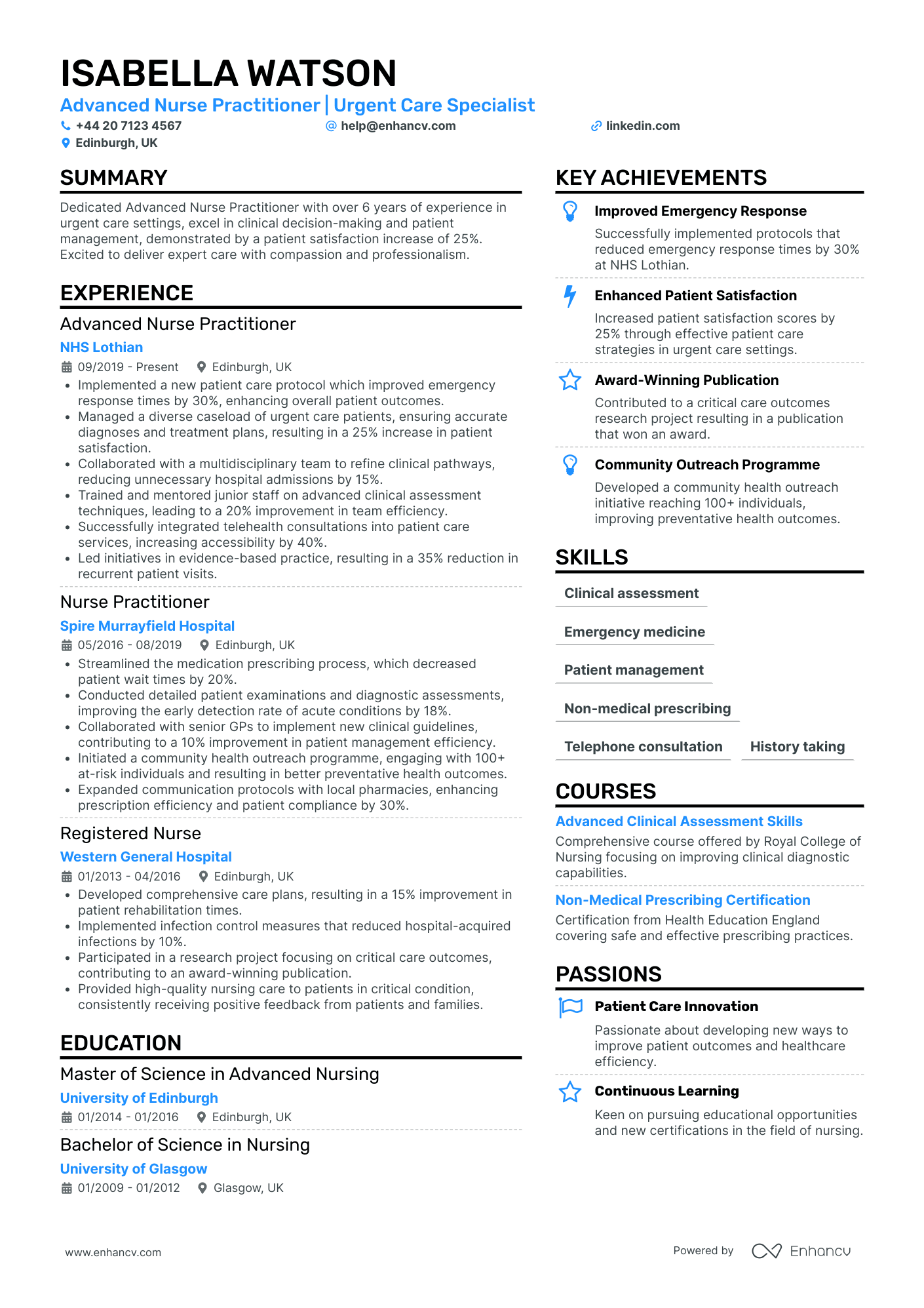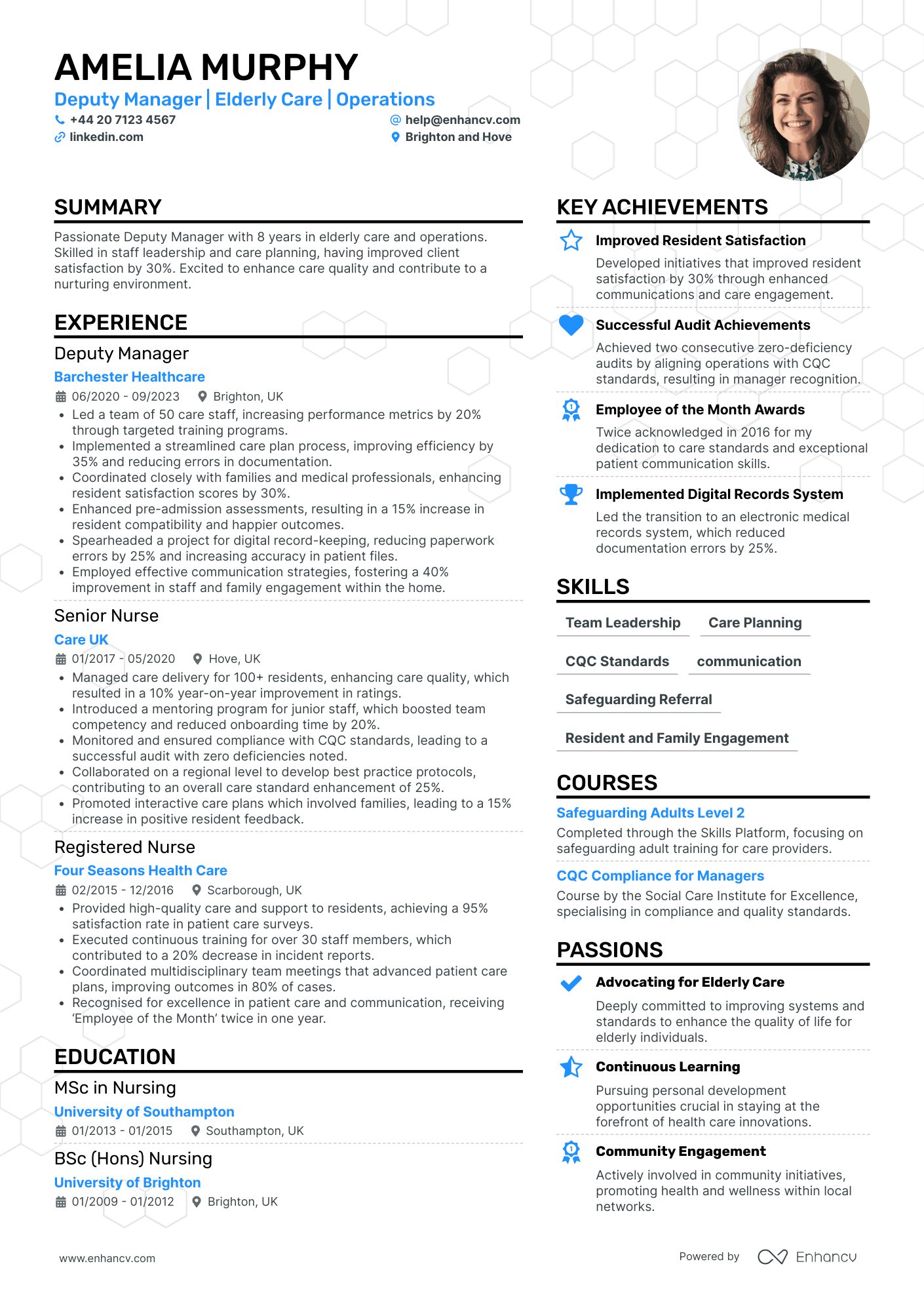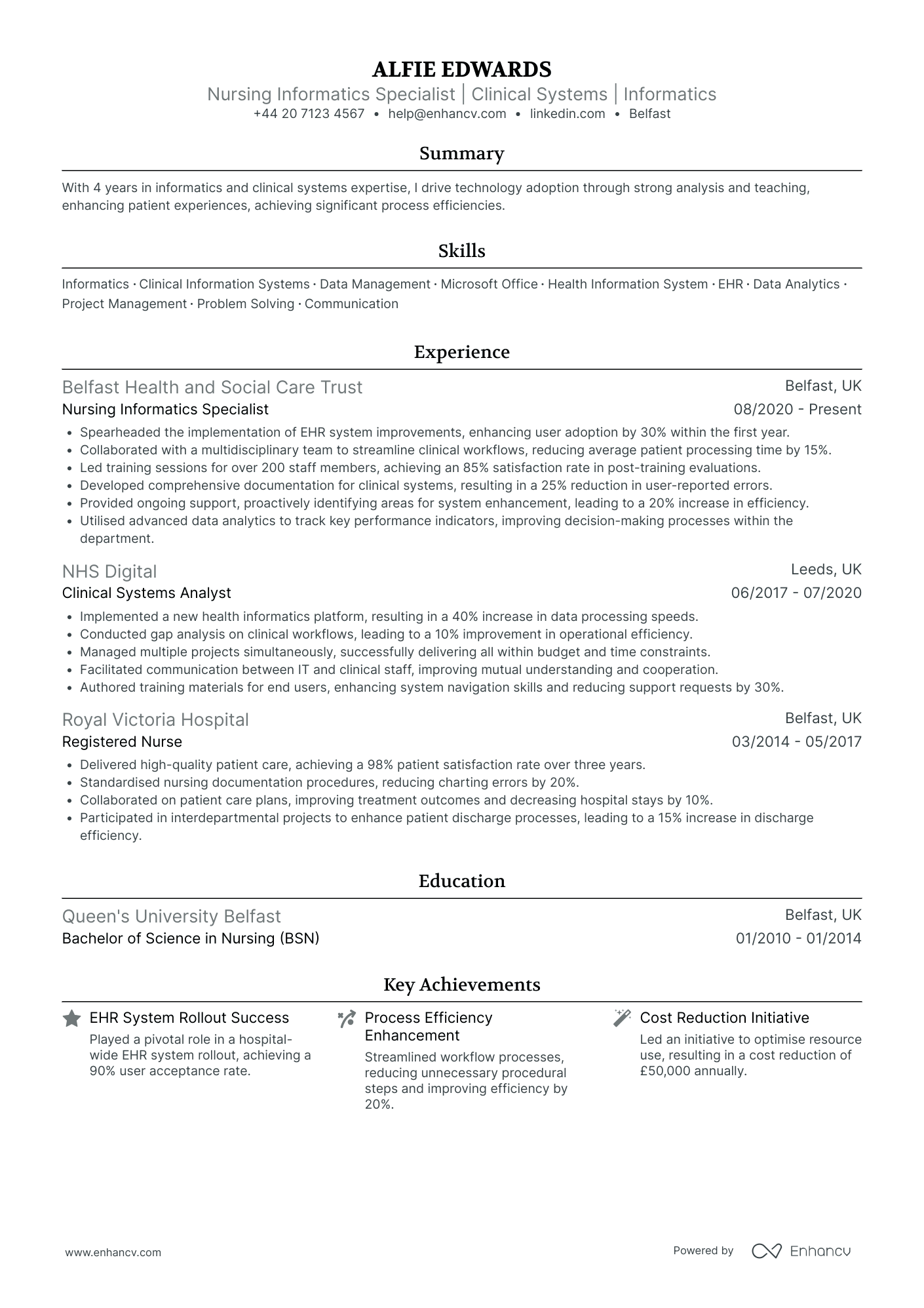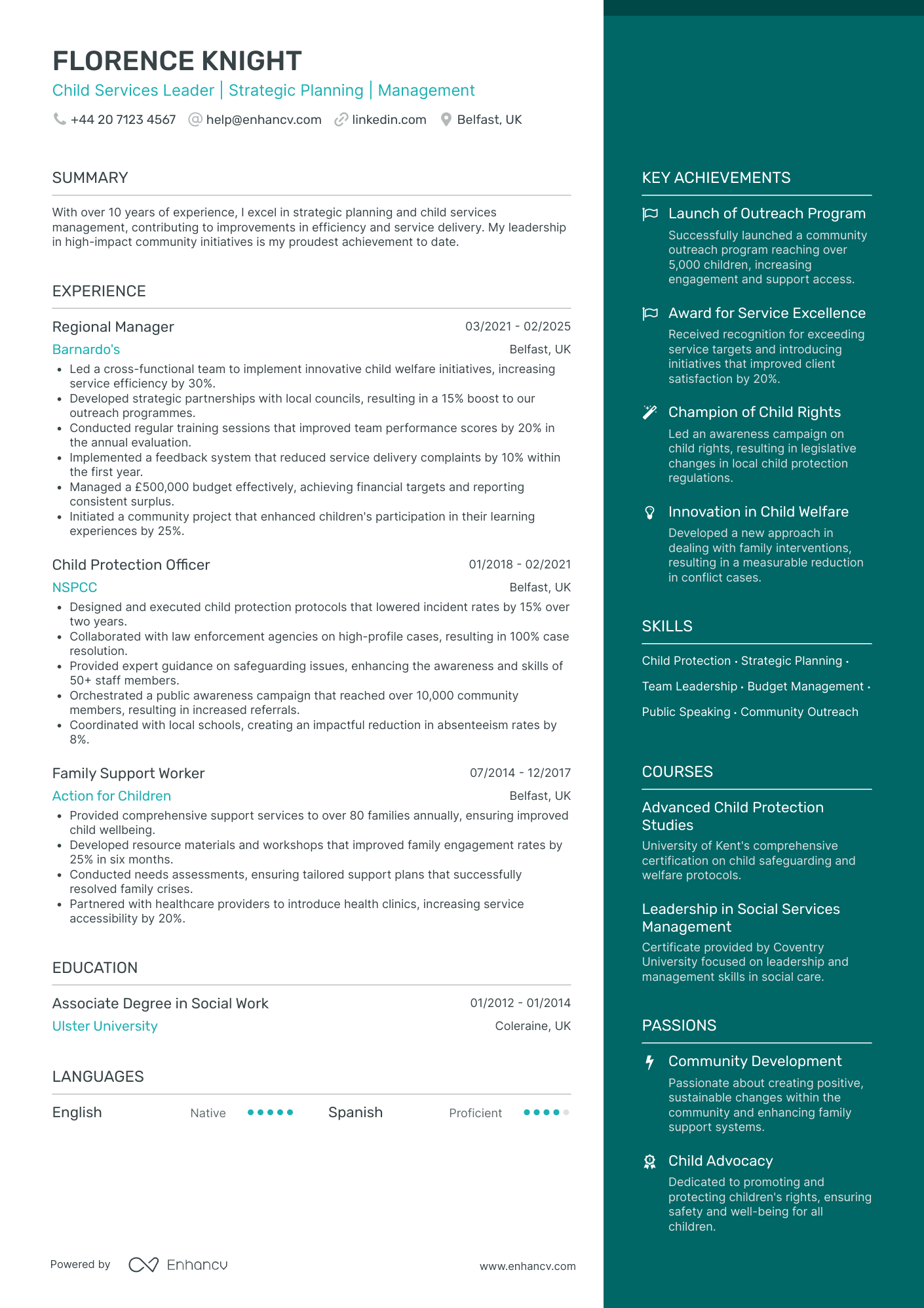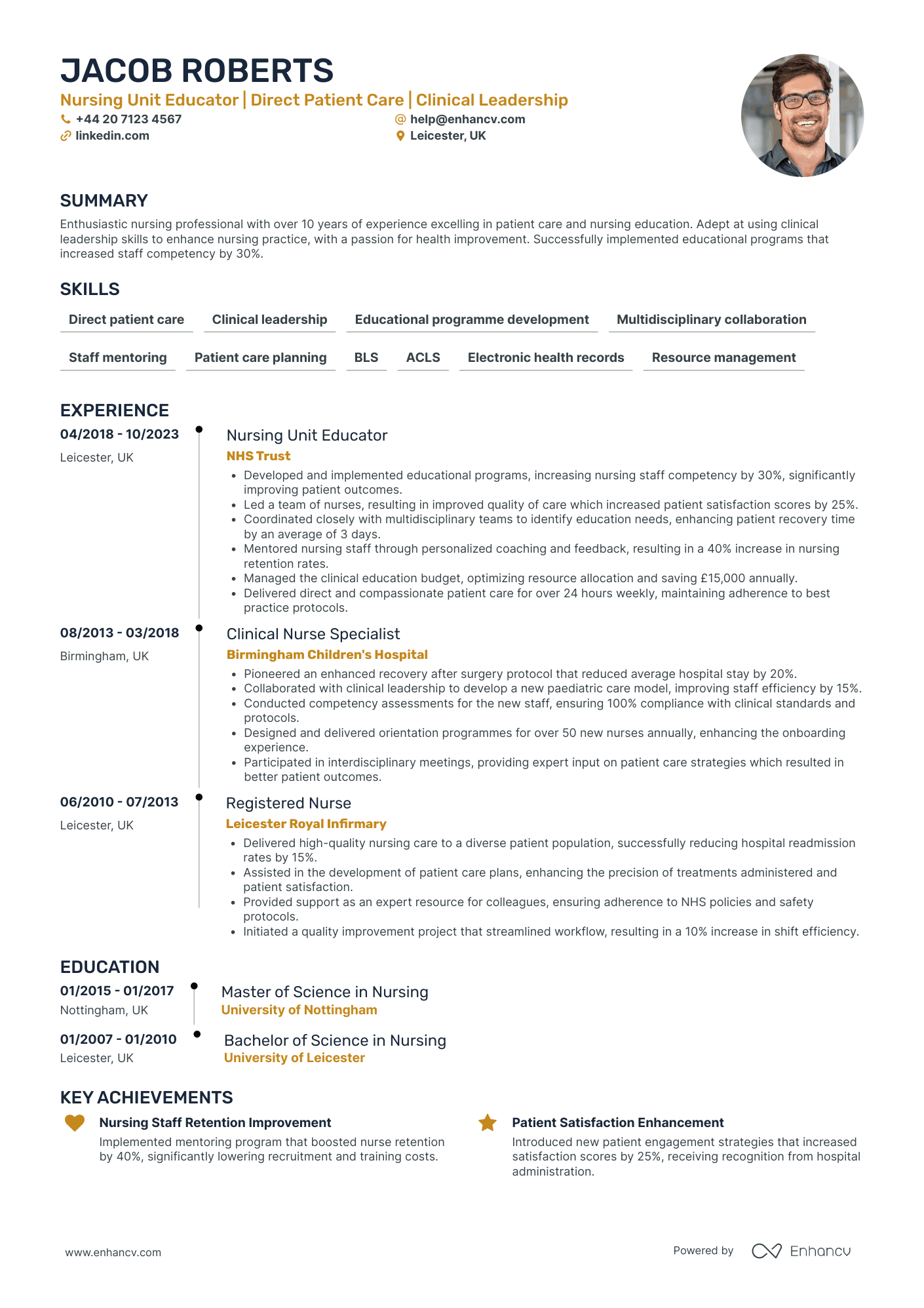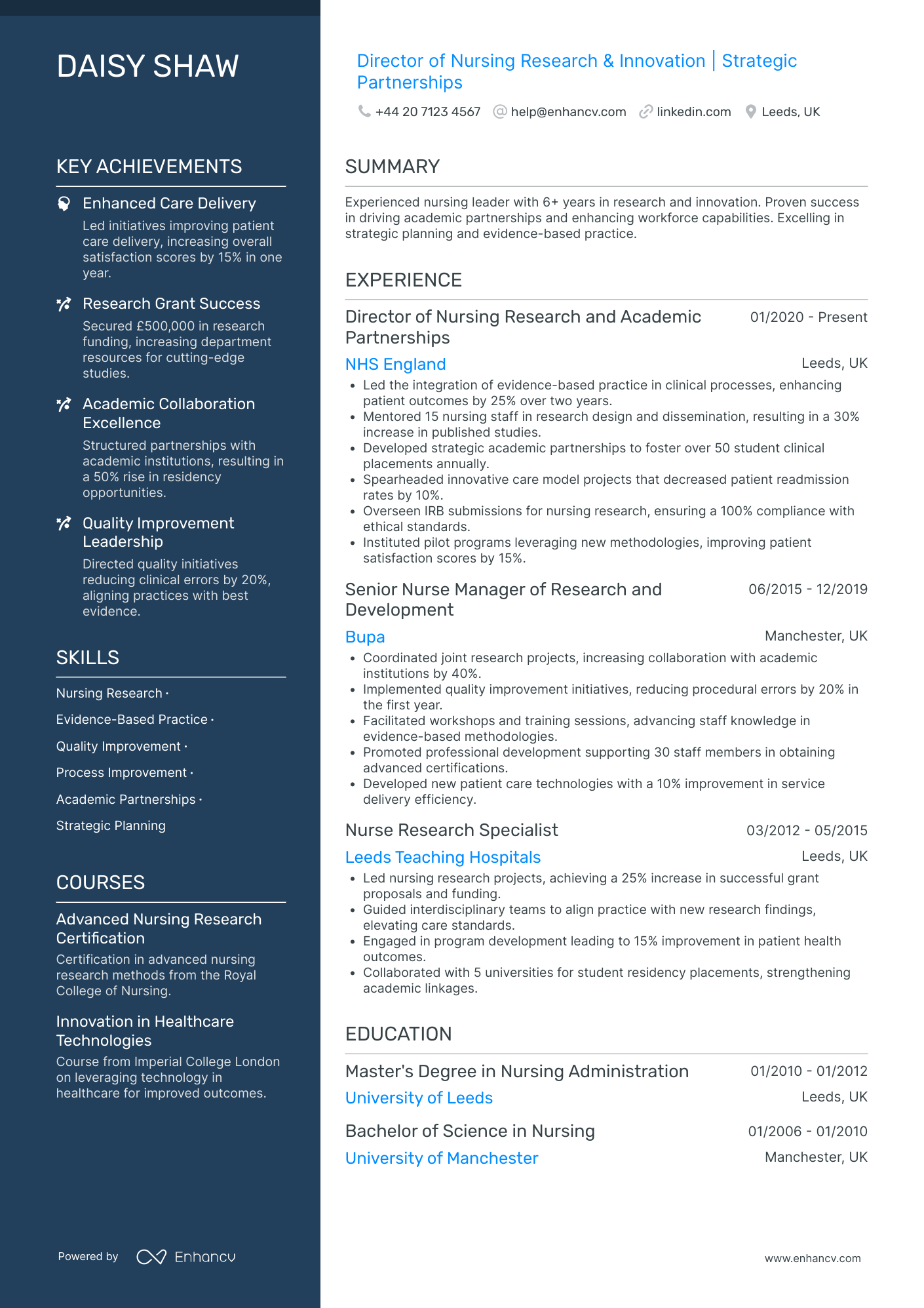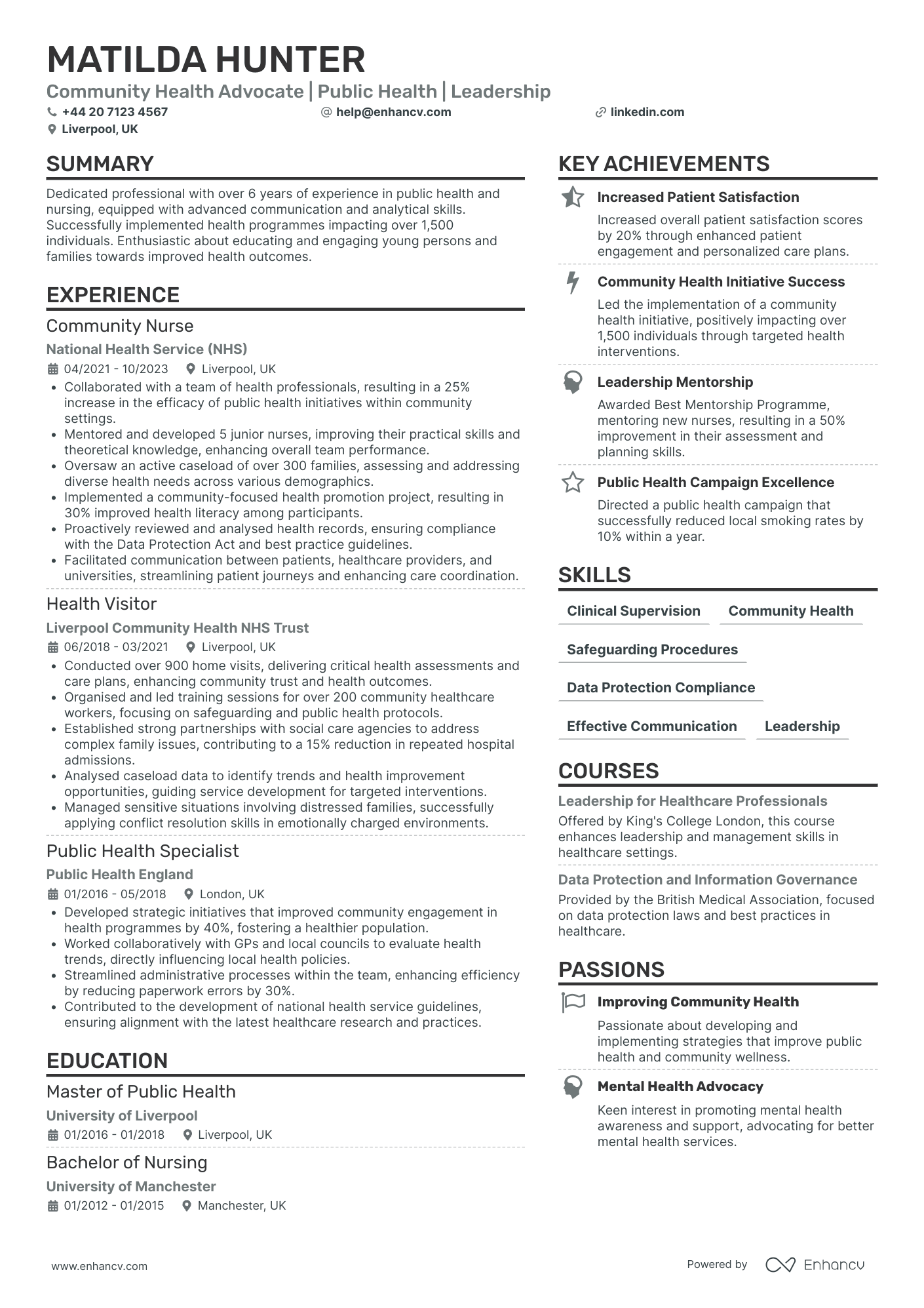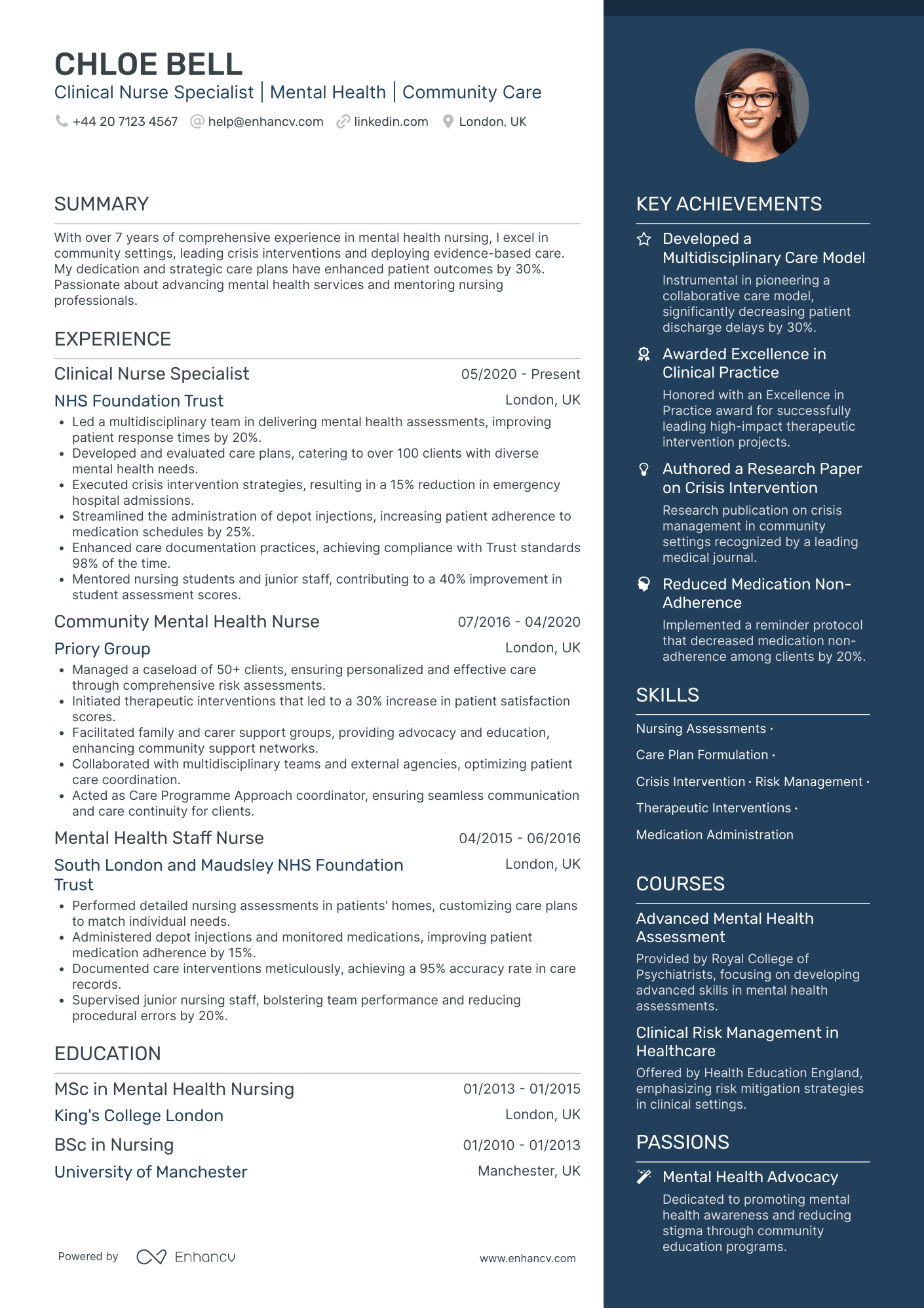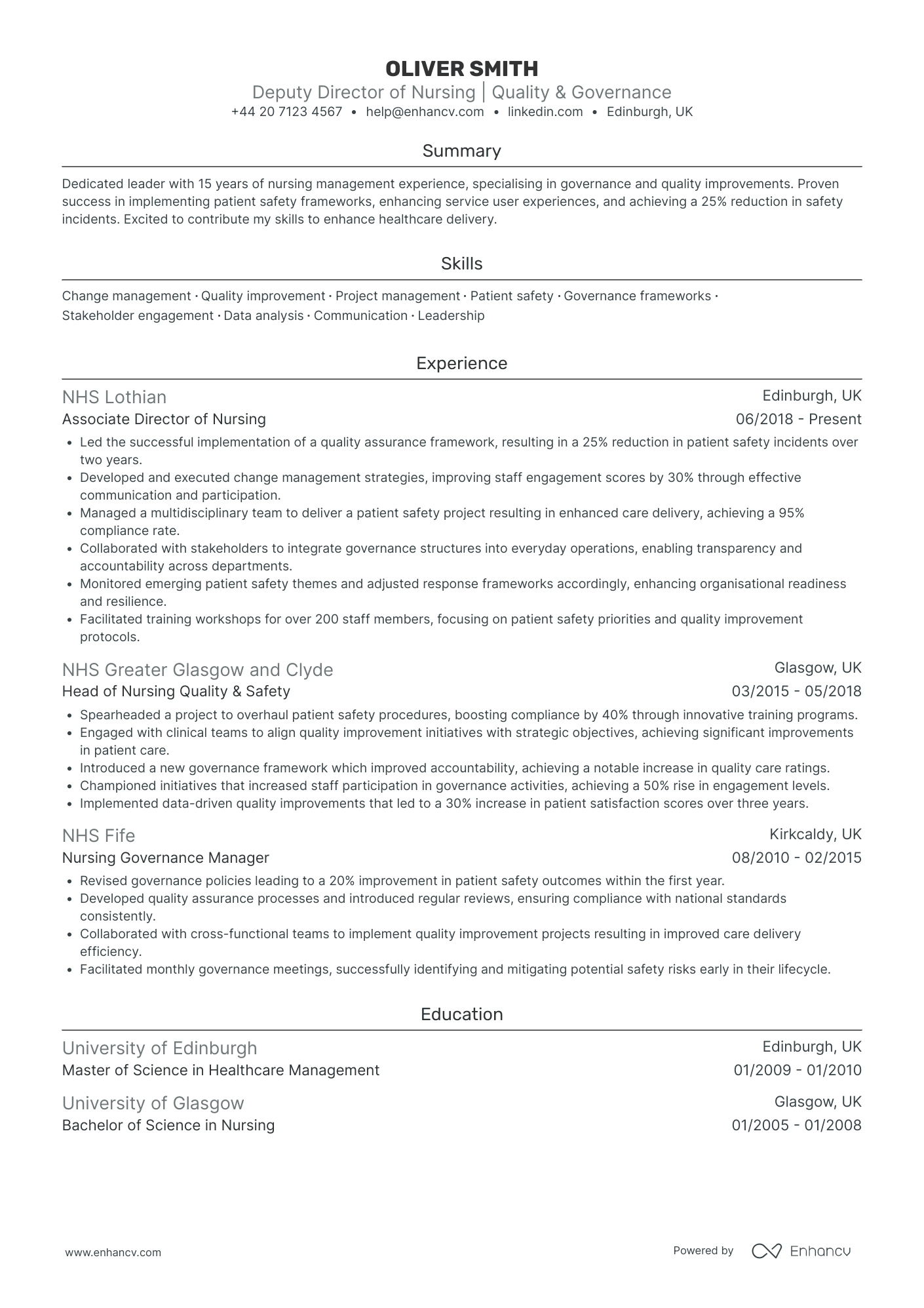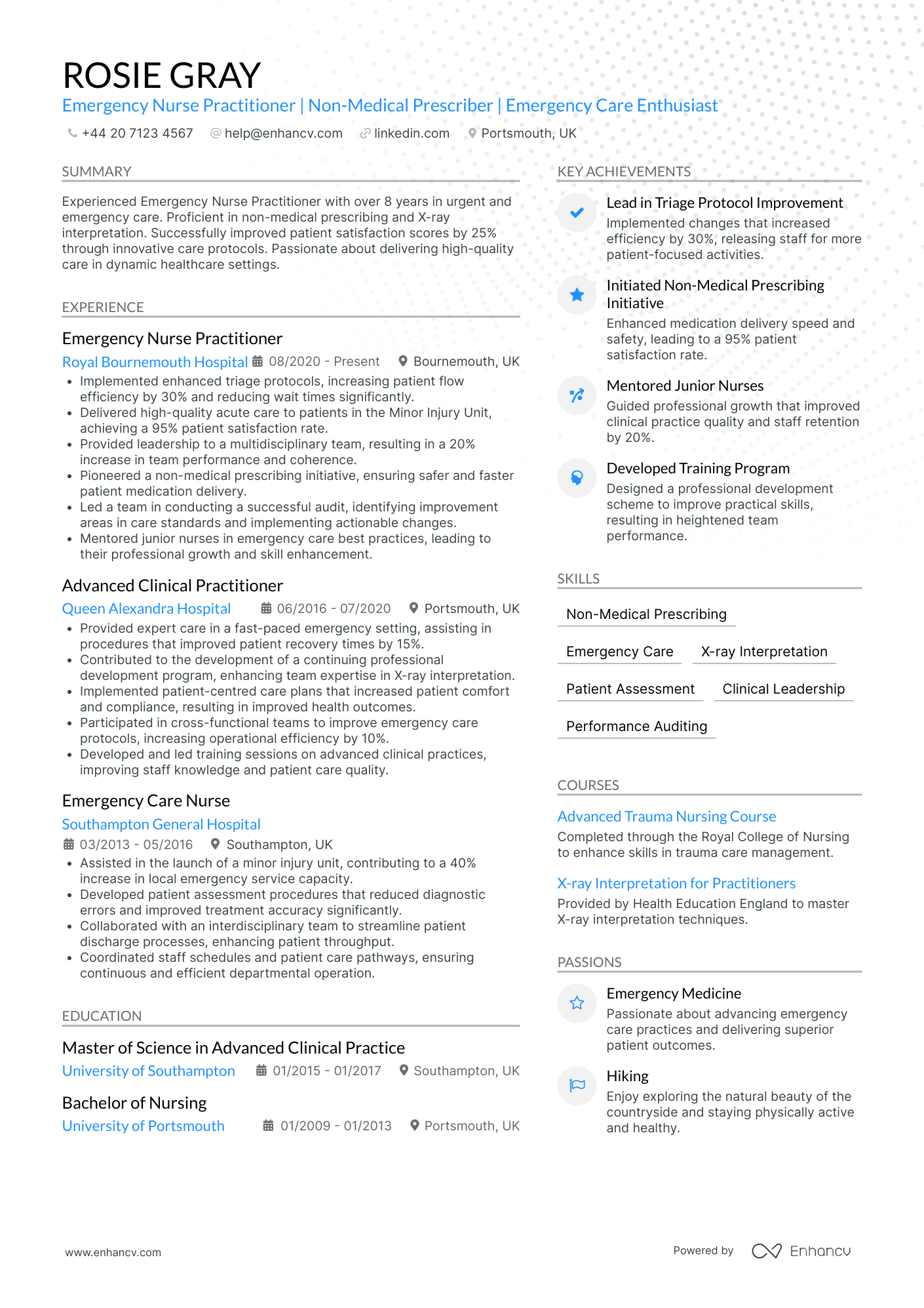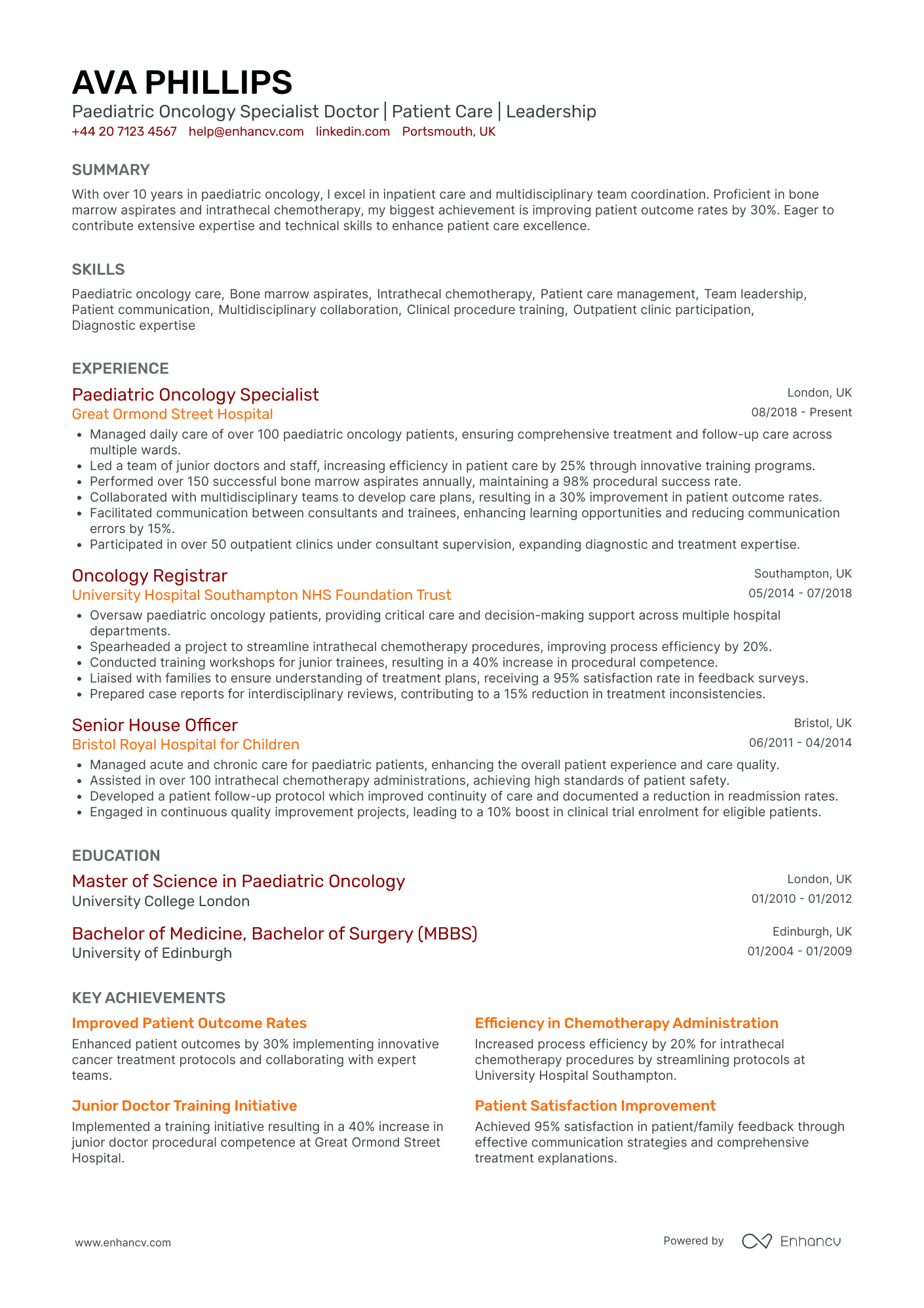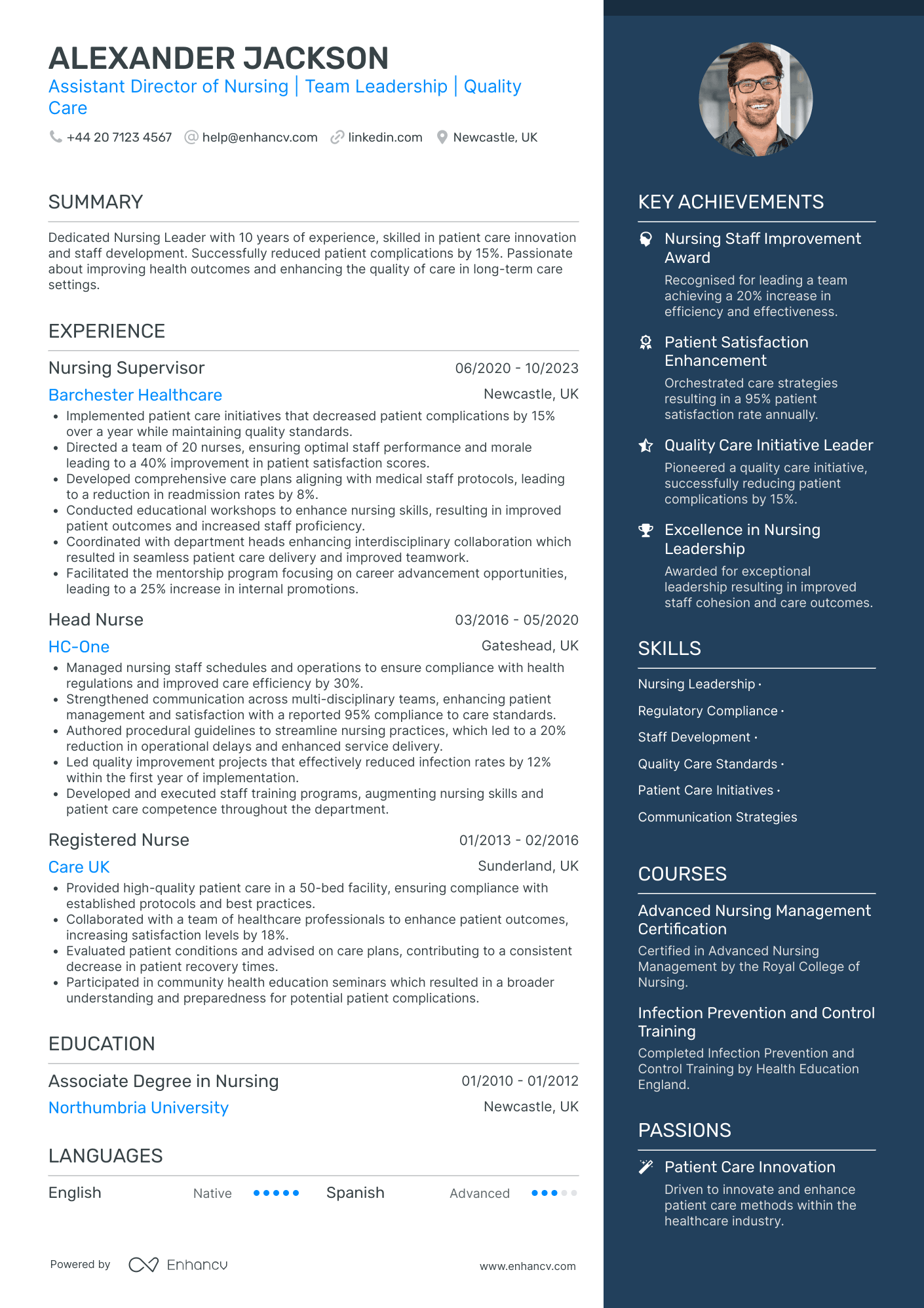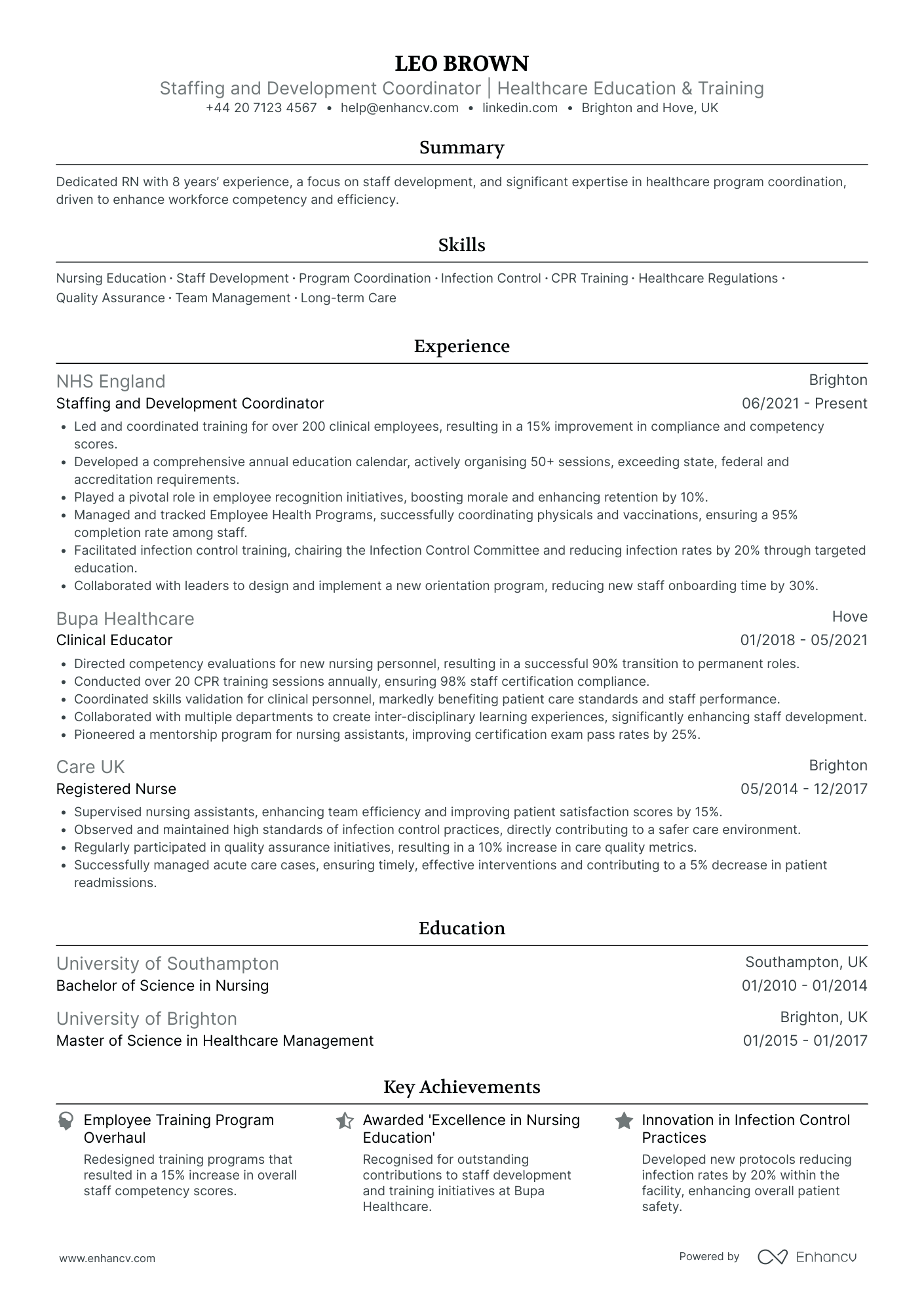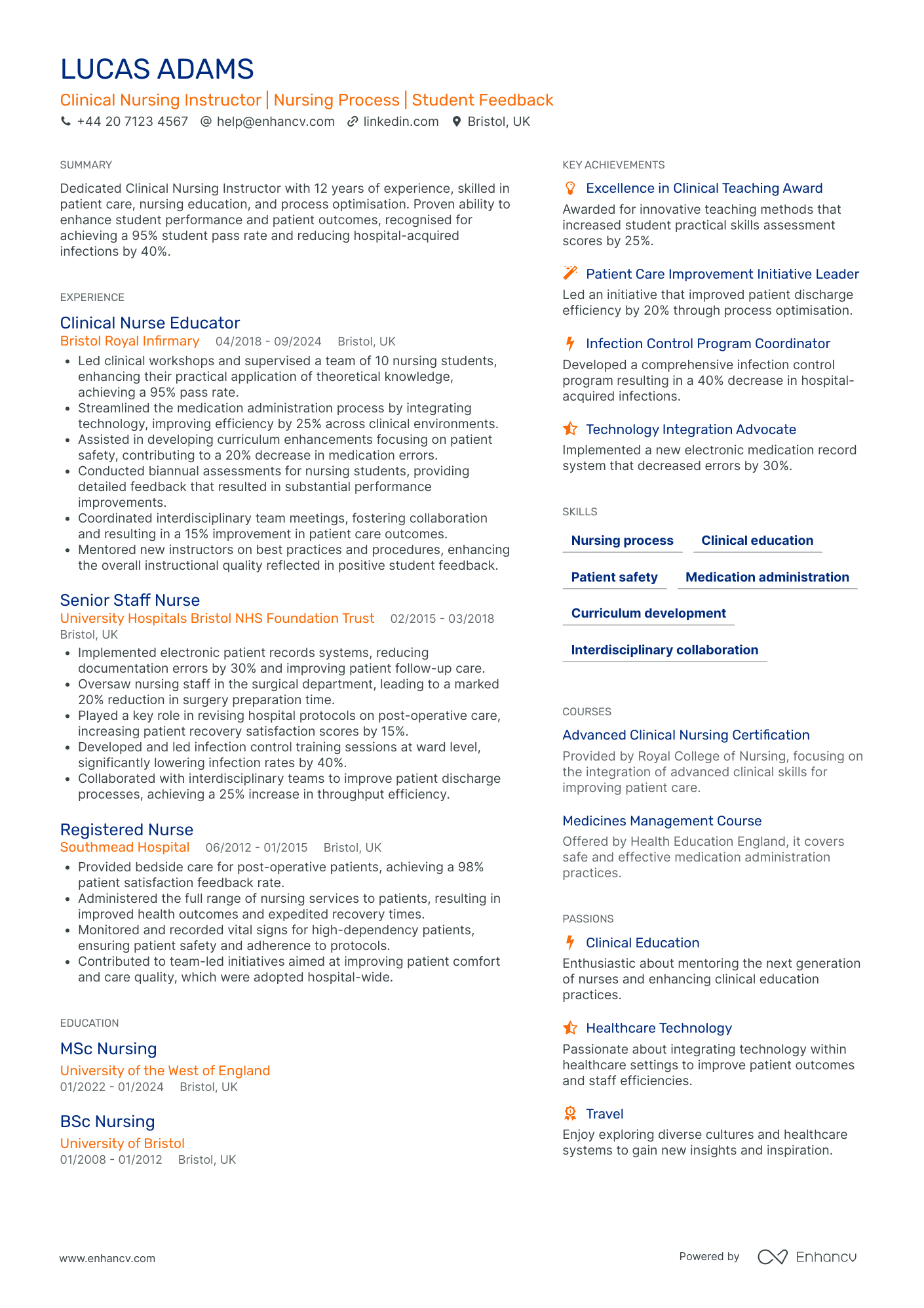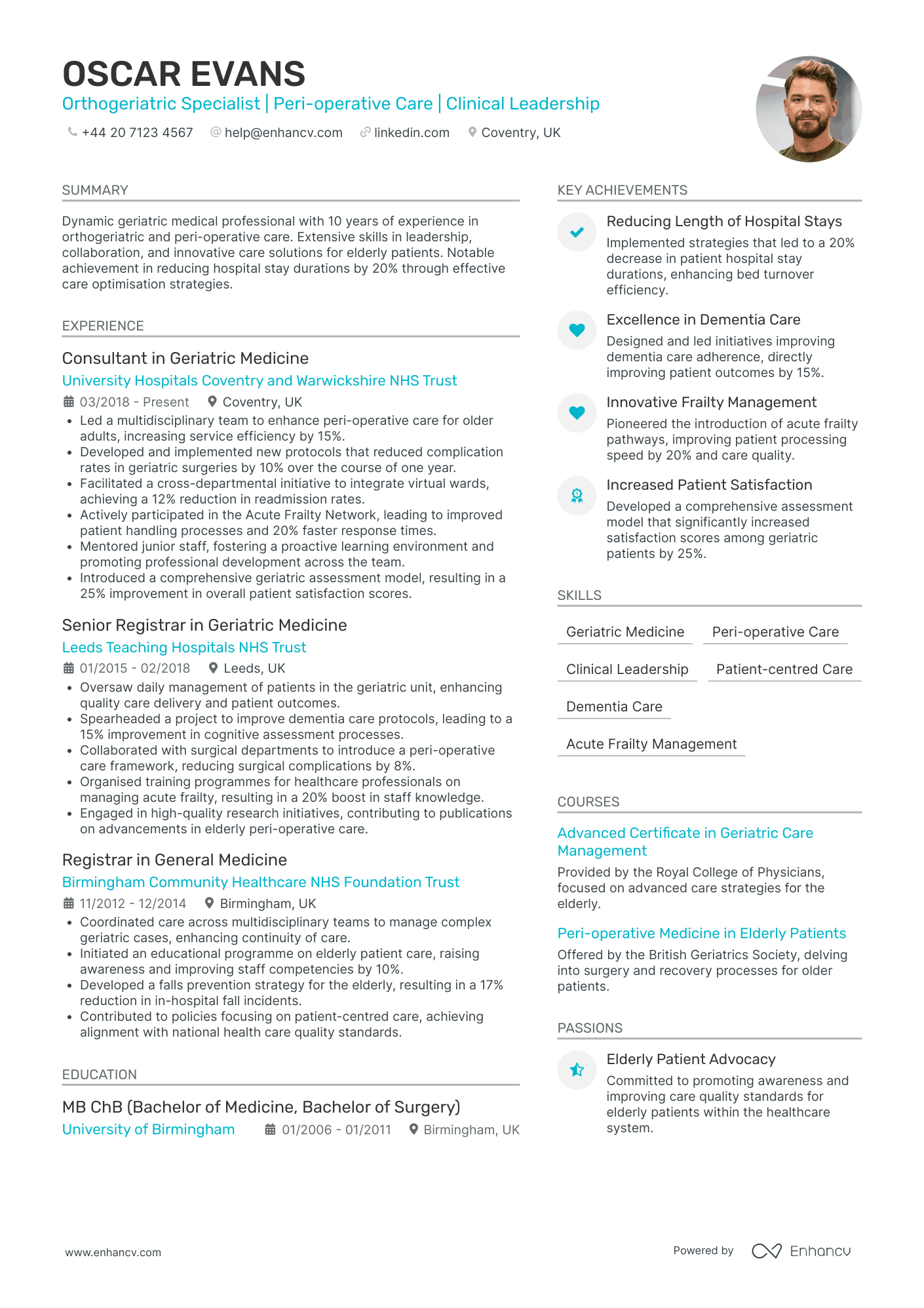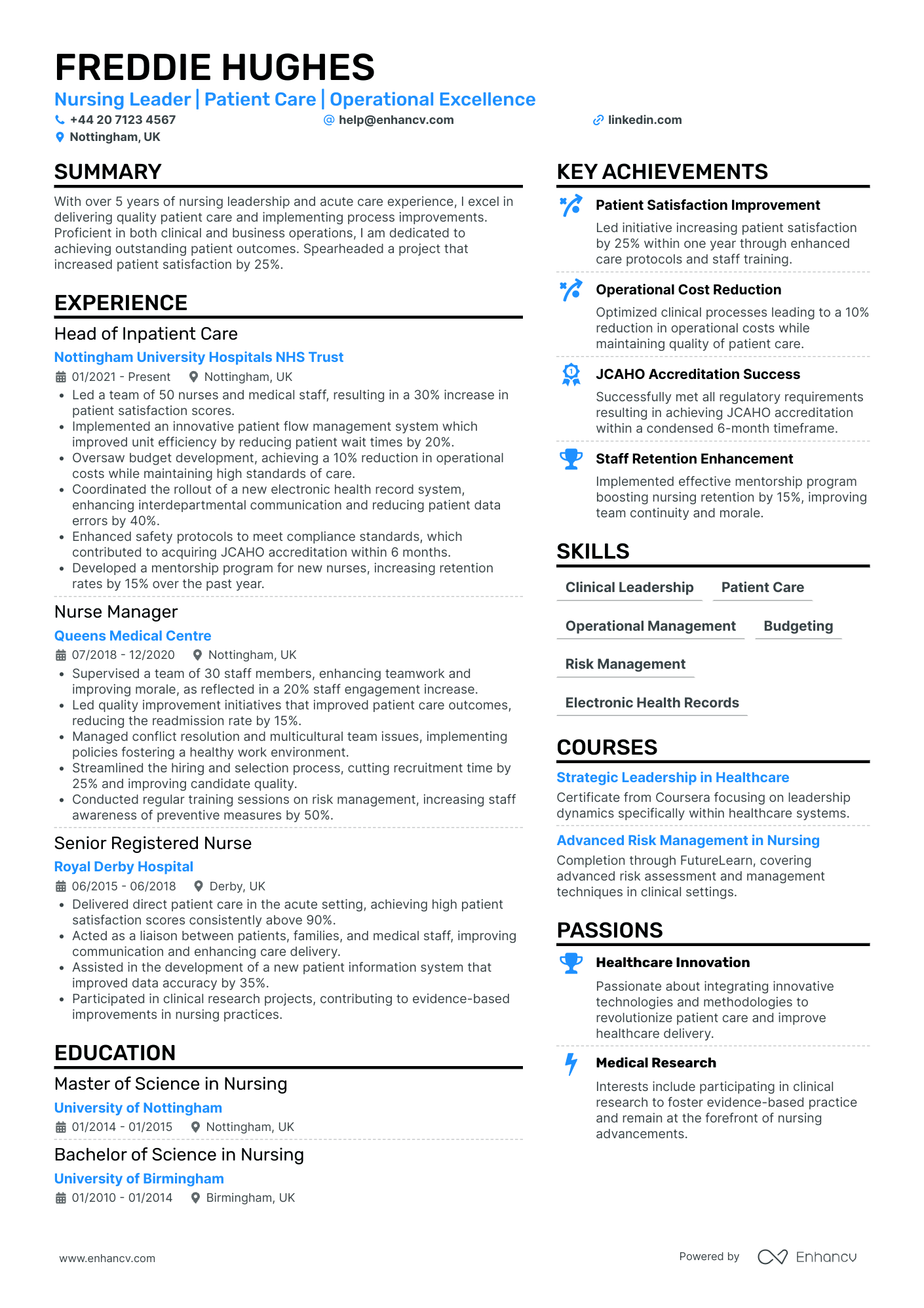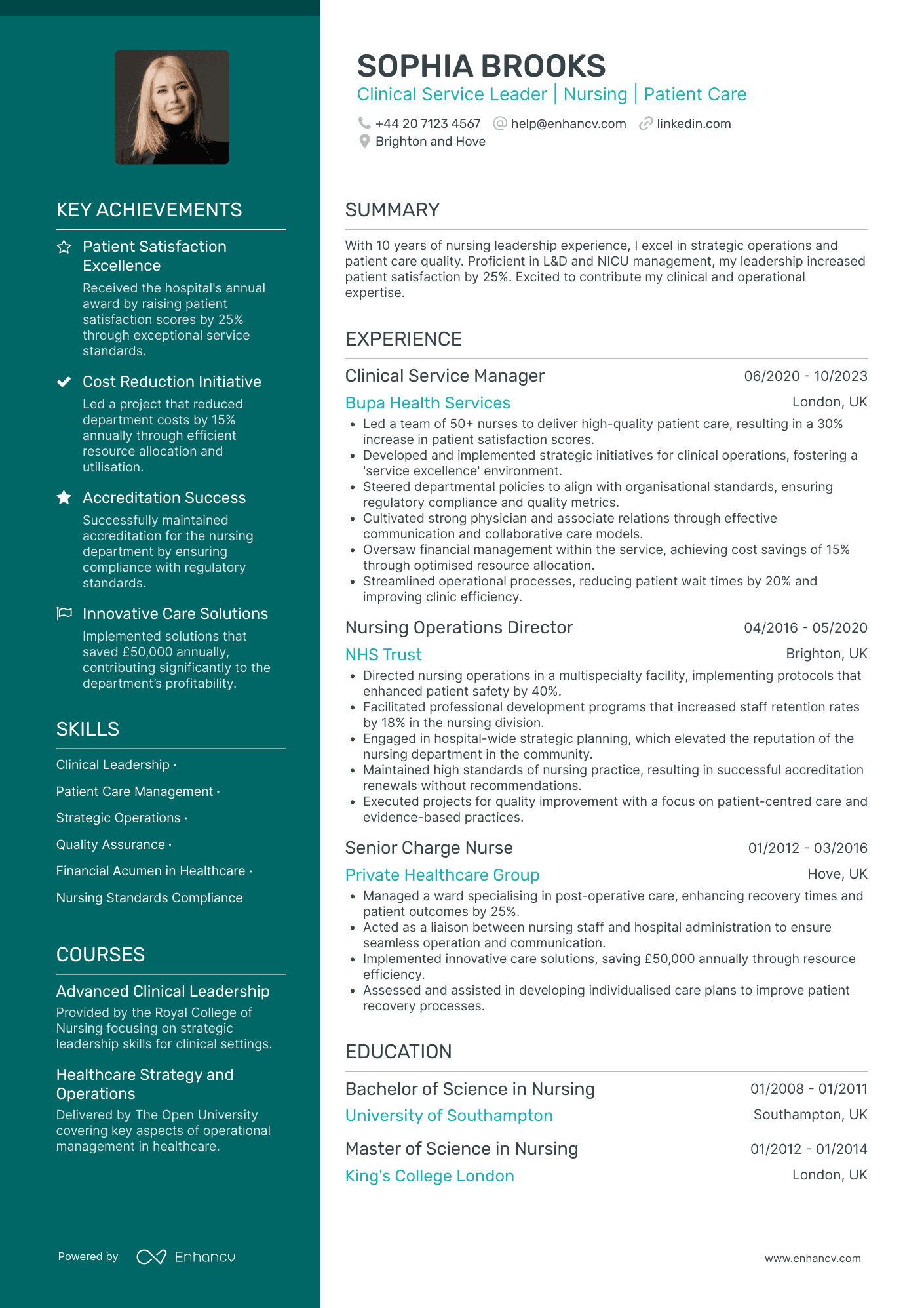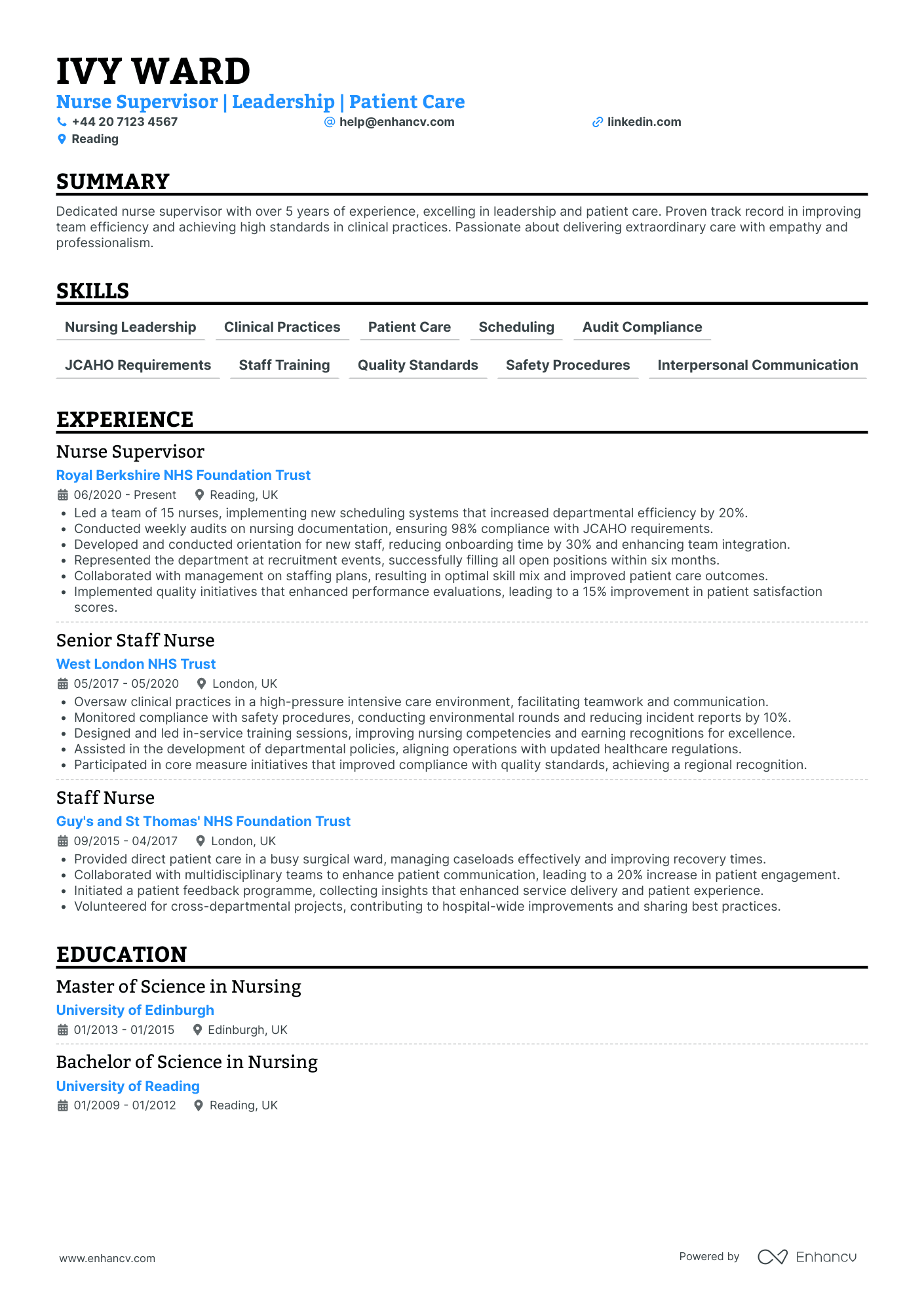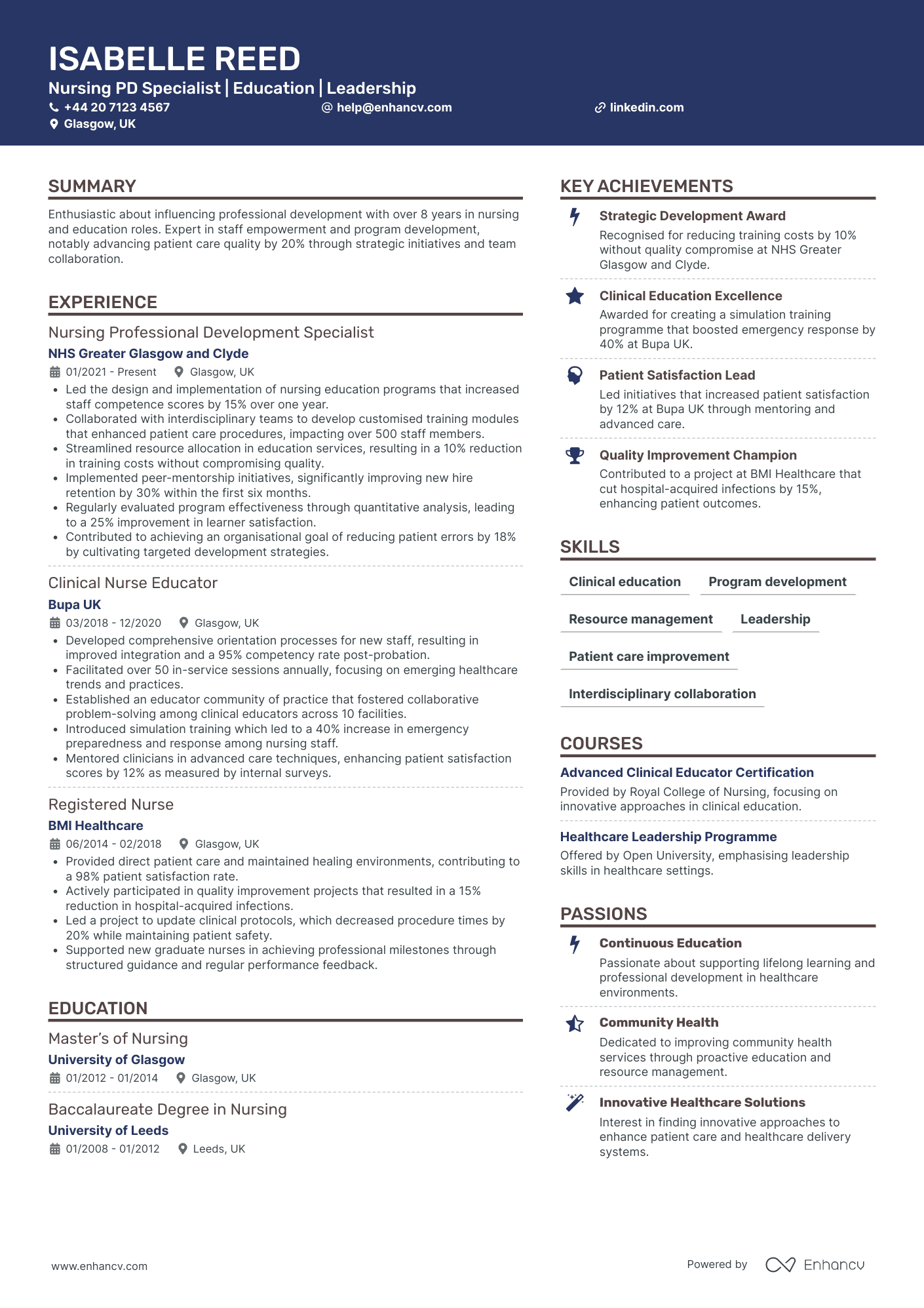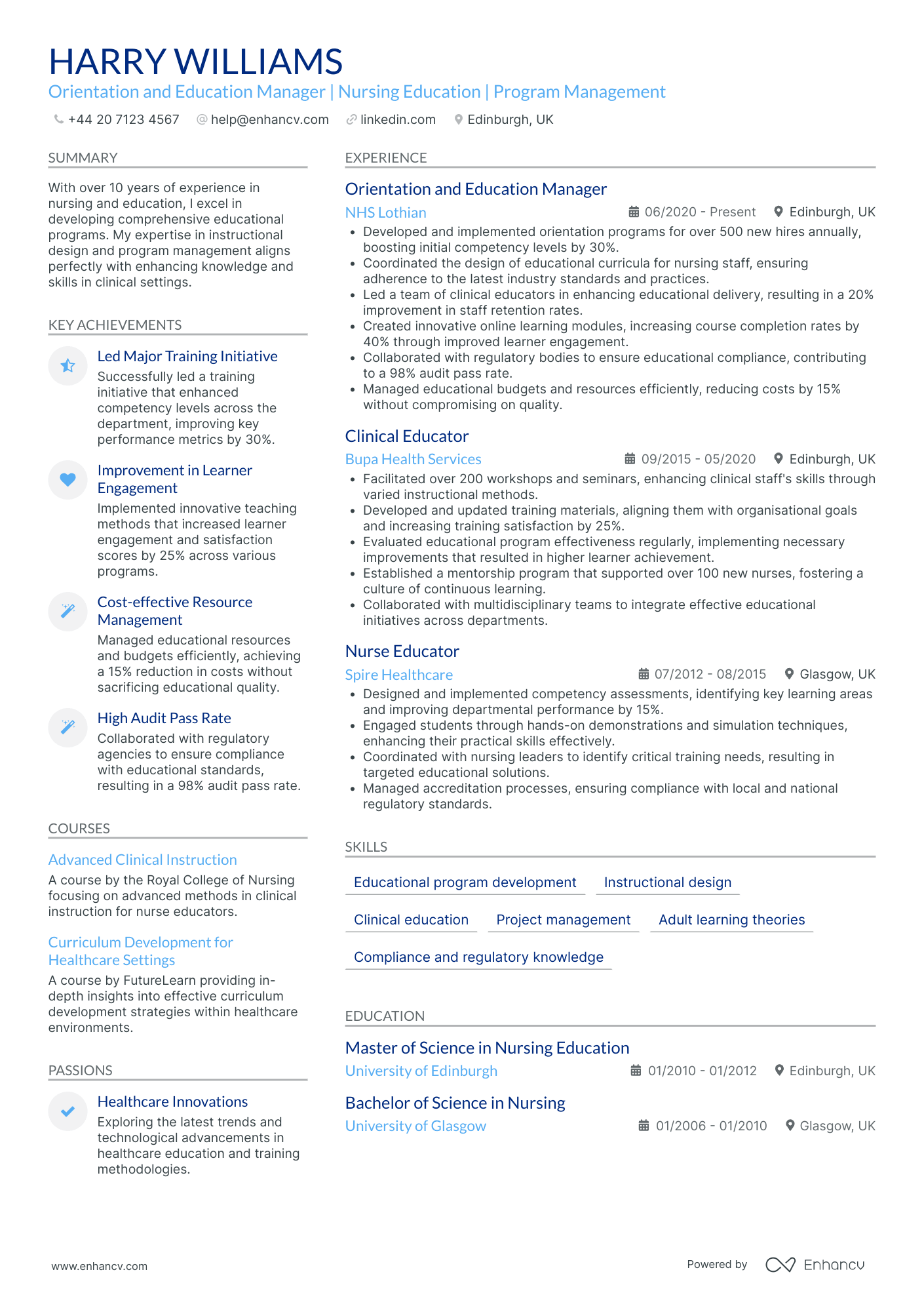Crafting a CV that effectively showcases your clinical skills and empathy can be a daunting task in the nursing profession. Our guide offers tailored advice to navigate this challenge, helping you to present a compelling narrative that captures both your professional expertise and compassionate care.
- Applying the simplest CV design, so that recruiters can easily understand your expertise, skills, and professional background;
- Ensuring you stand out with your header, summary or objective statement, and a designated skills section;
- Creating your CV experience section - no matter how much expertise you have;
- Using real life professional CV examples to enhance the structure and outline of your profile.
If you still have no muse to write your professional CV, find some more industry-leading examples.
Resume examples for nursing
By Experience
Advanced Practice Registered Nursing (APRN)
- Content presentation and structure clarity - The CV is well-organized and maintains clarity with distinct sections dedicated to experience, education, skills, and achievements. It uses bullet points effectively to ensure concise delivery of information, making it easy to skim through the details relevant to her role as an Advanced Nurse Practitioner.
- Career trajectory and growth - Isabella's career progression from a Registered Nurse to an Advanced Nurse Practitioner highlights consistent growth and expertise in urgent care. This upward trajectory is marked by key promotions and the acquisition of advanced skills, reflecting her dedication to professional development within the healthcare sector.
- Adaptability and cross-functional experience - The CV demonstrates Isabella's adaptability through her successful integration of telehealth services and her collaborative approach with multidisciplinary teams. These experiences underline her ability to adjust to technological advancements and work efficiently across various healthcare functions, enhancing patient care accessibility and outcomes.
By Role
Nursing Home Manager
- Clarity through structure - The CV has a well-organized format that clearly delineates each section, allowing for easy navigation. The use of concise bullet points under experience helps to quickly convey critical accomplishments and responsibilities, making it accessible for busy hiring managers.
- Impressive career trajectory - Amelia Murphy's career has shown consistent growth, transitioning from a Registered Nurse to a Deputy Manager within the healthcare sector. This progression underscores her ability to take on more responsibility and lead larger teams, demonstrating her upward mobility and commitment to the industry.
- Effective implementation of industry standards - The CV emphasizes Amelia's adeptness at implementing industry-specific methodologies such as enhancing CQC standards compliance and digital record-keeping. These initiatives highlight her technical know-how and her contribution to improving operational efficiencies and patient care outcomes in healthcare settings.
Nursing Informatics Specialist
- Structured and Clear Presentation - The CV showcases a well-organized format with distinct sections such as Summary, Experience, Education, Skills, and Achievements, allowing for easy navigation. Each section is concise yet comprehensive, providing key details that highlight Alfie Edwards' qualifications and professional journey with clarity.
- Adaptability and Cross-Functional Experience - Alfie Edwards demonstrates significant adaptability through his transition from roles as a Registered Nurse to a Nursing Informatics Specialist, reflecting cross-functional expertise in healthcare and technology. This trajectory underscores his ability to leverage clinical insights to enhance healthcare IT systems.
- Emphasis on Achievements and Impact - The CV effectively emphasizes measurable achievements, such as driving a 30% increase in user adoption of EHR systems and reducing user-reported errors by 25%, showcasing Alfie's capacity to make impactful contributions that align with organizational goals and patient care efficiencies.
Paediatric Nursing Specialist
- Demonstrates Strategic Leadership and Innovation - Florence Knight's CV articulates her ability to lead and innovate within child services, evidenced by her role in enhancing service efficiency by 30% through innovative initiatives. Her leadership is also recognized by her capacity to forge strategic partnerships and reduce complaints, showcasing her strategic planning capabilities and lower-level management expertise.
- Significant Career Progression and Influence - The CV showcases Florence's clear career trajectory from a Family Support Worker to a Regional Manager at Barnardo's. This growth highlights her expanding influence and responsibility within child welfare services, demonstrating her upward mobility and continuous professional development within the same field.
- Substantial Community Impact and Advocacy - Florence's achievements section underscores her commitment to community development and advocacy. Her initiatives, like launching a community outreach program that engaged over 5,000 children and driving legislative changes, showcase her ability to affect substantial positive change and advocate for child rights and welfare on larger scales.
Nursing Education Coordinator
- Impressive Career Progression - Jacob Roberts has demonstrated significant career growth, evolving from a Registered Nurse to a Nursing Unit Educator. The trajectory shows a clear path of increased responsibility, highlighting his ability to excel and adapt in various roles within the nursing field, which is crucial for a position that balances clinical leadership and education.
- Effective Presentation of Content - The CV is well-organized and concise, with each section providing relevant information that pertains directly to the role. The clear structure allows for easy navigation, ensuring that important details such as experience and achievements are immediately accessible, which aids in communicating his professional qualifications effectively.
- Strategic Impact through Achievements - The CV goes beyond just listing responsibilities; it showcases Jacob Roberts’ impact through specific initiatives and their outcomes, such as improving patient satisfaction scores by 25% and boosting nurse retention rates by 40%. These achievements demonstrate his strategic thinking and ability to drive meaningful results in healthcare settings.
Nursing Research Director
- Clarity and Structured Presentation - The CV is structured in a clear and concise manner, allowing key information to be easily identifiable. Utilization of headers and bullet points enhances the readability and ensures a systematic flow of information, making it accessible for quick reviews by hiring committees.
- Strategic Career Growth - Daisy Shaw's career trajectory shows a continuous rise in roles and responsibilities, moving from a Nurse Research Specialist to the Director of Nursing Research and Innovation. Her experience reflects a strong dedication to the healthcare sector and showcases a successful transition into leadership with a focus on strategic partnerships.
- Industry-Specific Innovations and Methodologies - The inclusion of spearheading innovative care models and the institution of pilot programs highlights an acute attention to implementing evidence-based practices. Her achievements in decreasing patient readmission rates and improving patient satisfaction scores underscore a proactive approach to healthcare innovation.
Community Health Nursing Manager
- Strong Track Record in Public Health Initiatives - Matilda Hunter's career trajectory showcases a clear and consistent growth within the public health domain, emphasizing her increasing responsibility from a Public Health Specialist to a Community Nurse at the NHS. Her progressive roles indicate her adaptability and commitment to impacting community health positively, which aligns perfectly with her title as a Community Health Advocate.
- Focus on Communication and Collaboration - The CV highlights Matilda's outstanding soft skills, particularly her ability to communicate and collaborate effectively with diverse groups. Her experience in mentoring junior nurses and facilitating communication across patients, healthcare providers, and institutions demonstrates robust leadership and interpersonal capabilities critical for her role.
- Significant Achievements with High Business Relevance - The accomplishments shared in the CV not only present impressive numbers but are also noteworthy for their profound impact on community well-being. For instance, her strategic initiatives led to a 40% improvement in health program engagement, while her campaign management reduced smoking rates by 10%, signifying her substantial contributions to public health outcomes.
Mental Health Nursing Supervisor
- Structured and Well-Organized Presentation - The CV is structured with clarity and conciseness, allowing quick identification of relevant information. Key sections such as experience, education, skills, and achievements are distinctly separated and well-articulated, making it easy for recruiters to grasp Chloe Bell's qualifications and capabilities.
- Progressive Career Trajectory in Mental Health Nursing - Chloe Bell's career progression reflects a steady growth in the mental health nursing field, starting as a Mental Health Staff Nurse and advancing to a Clinical Nurse Specialist. This transition demonstrates increasing responsibility, leadership, and expertise in managing complex patient care dynamics, particularly in community settings.
- Impactful Achievements with Industry Relevance - The CV effectively highlights achievements that underscore Chloe Bell's impact on healthcare delivery. Initiatives like reducing emergency hospital admissions and improving patient response times showcase her ability to implement strategies that not only provide financial benefits to healthcare institutions but also improve patient care outcomes significantly.
Nursing Quality Assurance Director
- Structured and Targeted Presentation - The CV is well-organized and concise, with clear sections that logically unfold Oliver Smith's career trajectory and achievements. It makes effective use of bullet points to ensure readability and focuses on presenting key data and accomplishments in a succinct manner.
- Progressive Career Growth - Oliver's career trajectory within the NHS demonstrates significant upward mobility, from roles like Nursing Governance Manager to Deputy Director of Nursing. This reflects continuous professional growth and increased responsibilities, showcasing dedication and competence in his field.
- Impactful Achievements with Strategic Business Relevance - Oliver's CV emphasizes achievements in reducing safety incidents by 25% and improving patient satisfaction by 30%. These accomplishments not only demonstrate adept handling of patient care and safety but also underline direct contributions to the efficiency and reputation of healthcare organizations.
Emergency Nursing Practitioner
- Highlights progressive career growth in emergency care - Rosie Gray's career trajectory demonstrates a clear progression through increasingly responsible roles in emergency care. Starting as an Emergency Care Nurse and advancing to an Emergency Nurse Practitioner, her career path reflects significant professional growth and mastery of critical aspects of emergency healthcare.
- Showcases exceptional leadership and mentorship skills - The CV effectively illustrates Rosie's leadership capabilities, not only through her ability to increase team performance by 20% but also by mentoring junior nurses. This aspect of her experience highlights her capacity to foster professional development and enhance clinical practices within her team.
- Deep expertise in non-medical prescribing and care protocols - The unique inclusion of non-medical prescribing proficiency underscores Rosie's technical depth and specialization in the industry. Her experience in pioneering non-medical prescribing initiatives showcases her commitment to innovative healthcare solutions, which significantly improved patient satisfaction and medication delivery efficiency.
Oncology Nursing Consultant
- Comprehensive Skill Set for Paediatric Oncology - The CV encapsulates a broad array of industry-specific skills such as bone marrow aspirates and intrathecal chemotherapy, which are crucial for a paediatric oncology specialist. Ava’s hands-on experience with these procedures underscores her technical prowess and deep commitment to patient care excellence.
- Demonstrated Leadership and Team Building - Ava’s leadership is evident through her role in managing a team of junior doctors, where innovative training programs led to a 25% increase in patient care efficiency. This highlights not only her ability to lead but also to mentor and develop the capabilities of her team, which is vital for the demanding healthcare environment.
- Notable Achievements with Significant Impact - The CV prominently features achievements such as improving patient outcomes by 30% and increasing procedural competence among junior doctors by 40%. These accomplishments reflect Ava’s strategic approach and her capacity to implement changes that contribute to significant improvements in healthcare delivery.
Nursing Assistant Director
- Clear and Structured Content Presentation - The CV is effectively structured, presenting all key information sections such as experience, education, skills, and achievements clearly and logically. This organization ensures that each section serves its purpose concisely, helping the reader quickly grasp the candidate's qualifications and expertise.
- Impressive Career Trajectory and Leadership Growth - Alexander Jackson's career path showcases significant growth from a Registered Nurse to an Assistant Director of Nursing. With promotions at each step, the trajectory highlights an upward movement and increasing responsibilities in leadership and quality care management, demonstrating his growth in the industry.
- Impactful Achievements in Healthcare - The CV emphasizes achievements in reducing patient complications and improving patient satisfaction. These accomplishments are not just numbers but indicate substantial impacts on healthcare delivery and effectiveness, showcasing the candidate's role in creating meaningful business outcomes within the industry.
Nursing Staff Development Coordinator
- Clear and Concise Content Presentation - The CV is structured with clearly defined sections, such as experience, education, skills, and achievements, making it easy to navigate. Key points are highlighted with bullet points, ensuring clarity and conciseness, and allowing the reader to quickly ascertain the candidate’s key strengths and accomplishments.
- Career Progression in Healthcare - Leo Brown’s career trajectory showcases a well-defined growth path within the healthcare industry, advancing from a Registered Nurse to a Staffing and Development Coordinator. This progression highlights an increasing level of responsibility and expertise, illustrating a commitment to advancing within the field of healthcare education and management.
- Emphasis on Soft Skills and Leadership - The CV effectively demonstrates Leo Brown’s soft skills, such as team management and leadership, through initiatives like employee recognition, mentorship programs, and inter-departmental collaboration. These initiatives underline his ability to enhance workforce morale and boost staff retention and development, making him an asset to any healthcare education team.
Nursing Clinical Instructor
- Content presentation emphasizes clarity and impact - The CV is structured in a concise manner, providing a quick overview of Lucas Adams' key qualifications and experiences. Each section is well-organized, making it easy for a reader to identify the main points, such as his teaching and process optimization roles, while effectively interweaving his professional achievements throughout.
- Career trajectory illustrates progressive growth in clinical education - Lucas's career progression from a Registered Nurse to Clinical Nurse Educator portrays a clear path of professional development within the nursing and healthcare education field. The transition through increasing levels of responsibility and influence highlights his dedication and capability in advancing medical instructional practices and patient care.
- Demonstrates industry relevance through unique methodologies - The CV highlights Lucas's ability to integrate technology into clinical settings, showing his innovative approach to problem-solving in healthcare environments. By streamlining medication administration processes and implementing electronic patient records, he showcases a forward-thinking mindset that resonates with current industry trends towards digital healthcare solutions.
Geriatric Nursing Specialist
- Clarity and Structure - The CV is well-structured, presenting information in a clear and logical manner. Each section is concise, ensuring key details stand out without overwhelming the reader. The use of bullet points helps to quickly convey responsibilities and achievements, aiding in easy comprehension of the candidate's expertise and impact in the geriatric medical field.
- Impressive Career Trajectory - Oscar Evans' CV exhibits a progressive career in geriatric medicine, highlighted by strategic advancements from a Registrar to a Consultant role. This trajectory signifies not only professional growth but also a deepening of expertise in orthogeriatric and peri-operative care, demonstrating a focused commitment to improving elderly patient care over time.
- Impactful Achievements - The CV emphasizes quantifiable achievements, such as reducing hospital stays by 20% and enhancing service efficiency by 15%. These accomplishments demonstrate the candidate's ability to implement effective strategies that translate into real-world benefits for healthcare providers, impacting not just operational metrics but also patient well-being and satisfaction.
Nursing Operations Manager
- Strategic Leadership Highlighted - The CV effectively showcases Freddie Hughes' leadership skills by presenting a clear progression from a Senior Registered Nurse to Head of Inpatient Care. This advancement demonstrates his ability to lead large teams, implement strategic changes, and manage complex healthcare settings successfully.
- Quantified Accomplishments with Impact - The CV provides concrete numbers that emphasize Freddie's contributions to improving patient care and operational processes. For instance, reducing patient wait times by 20% and increasing patient satisfaction by 25% establishes his capability to enhance healthcare delivery and efficiency markedly.
- Adaptability through Cross-Functional Experience - Freddie's experience in diverse roles within the NHS illustrates his adaptability and willingness to embrace various challenges. His history of coordinating electronic health records and developing budget strategies indicates a versatile ability to address both clinical and administrative tasks effectively.
Nursing Services Director
- Concise and Structured Presentation - The CV excels in presenting the information with clarity and brevity. Each section is well-organized, from the detailed yet concise bullet points under work experience to the cleanly segmented skills, education, and achievements sections. This structured approach ensures easy navigation and quick understanding of Sophia Brooks’ qualifications and history.
- Demonstrated Career Growth in Leadership Roles - Sophia Brooks’ career trajectory showcases a robust advancement from a Senior Charge Nurse to a Clinical Service Leader. This progression highlights significant growth in responsibilities, reflecting her increasing value within organizations like NHS and Bupa Health Services, and signal a consistent track record of promotions and professional development.
- Impactful Achievements with Business Relevance - The CV highlights multiple achievements that underscore Sophia Brooks’ ability to generate substantial business results. From increasing patient satisfaction by 25% to reducing departmental costs by 15%, these accomplishments are not just numeric but demonstrate her direct positive influence on patient care quality and operational efficiency. Each achievement is linked to broader organizational goals, showcasing strategic alignment.
Critical Care Nursing Supervisor
- Structured and Clear Content Presentation - The CV is systematically organized with well-defined sections such as experience, education, skills, courses, achievements, languages, and passions, making it easy to read and comprehend. Each section contains concise bullet points that efficiently convey key information without overwhelming the reader.
- Impressive Career Trajectory Reflecting Leadership Growth - Ivy Ward’s career progression from a Staff Nurse to Nurse Supervisor showcases significant professional development. Her journey through respected institutions like Royal Berkshire NHS Foundation Trust highlights her growing leadership capabilities and increasing responsibilities, reflecting a trusted and expanding role in the healthcare sector.
- Impactful Achievements with Business Relevance - The CV emphasizes achievements with far-reaching impact, such as enhanced departmental efficiency by 20% and improved patient satisfaction scores by 15%. These metrics not only demonstrate standout individual performance but also highlight Ivy's strategic contributions to organizational success and healthcare excellence.
Nursing Professional Development Specialist
- Clear Structuring and Presentation - Isabelle Reed's CV opens with a succinct and well-organized presentation of her skills and experiences. The use of bullet points in the experience section aids clarity and allows the reader to quickly grasp key accomplishments without being mired in excessive detail. Her professional summary underscores her enthusiasm and relevant expertise in a concise manner, setting a comprehensive tone for the rest of the CV.
- Demonstrated Career Advancement and Growth - Over the years, Isabelle has consistently progressed in her career, moving from a Registered Nurse to a Clinical Nurse Educator, and finally to a Nursing Professional Development Specialist. This upward trajectory illustrates her dedication to professional development and leadership within the healthcare sector, showcasing her adaptability and drive to assume roles with greater responsibility.
- Impactful Achievements with Business Relevance - The CV emphasizes the quantifiable impact of Isabelle's initiatives, such as enhancing staff competence scores and reducing training costs. These achievements not only highlight her ability to drive improvements but also underline their relevance in achieving broader organizational goals, such as reducing patient errors and boosting patient satisfaction. The strategic development award and other recognitions further validate her effectiveness in implementing beneficial changes.
Nursing Clinical Audit Manager
- Clear and Structured Content Presentation - The CV is well-organized, featuring distinct sections such as experience, education, skills, and achievements. This clarity helps in quickly identifying key qualifications and past roles, making it easy for potential employers to understand the candidate's credentials and career path.
- Consistent Career Growth in Nursing Education - Harry’s career trajectory showcases a steady progression in the field of nursing education, moving from a Nurse Educator to becoming an Orientation and Education Manager. This upward career movement reflects a strong commitment to professional development and an ability to handle increasing responsibilities in the healthcare education sector.
- Effective Use of Soft Skills and Leadership - Throughout the CV, there is a significant emphasis on soft skills, especially in leadership, collaboration, and mentorship. These elements are vital in managing educational programs and teams, ensuring alignment with organizational goals, and fostering a supportive learning environment.
Structuring your nursing CV layout: four factors to keep in mind
There are plenty of best practices out there for your CV layout and design. At the end of the day, a clear format and concise CV message should be your top priority. Use your CV design to enhance separate sections, bringing them to the forefront of recruiters' attention. At the same time, you can write content that:
- Follows the reverse chronological order in the experience section by first listing your most recent jobs;
- Incorporates your contact information in the header, but do skip out on the CV photo for roles in the UK;
- Is spotlighted in the most important sections of your CV, e.g. the summary or objective, experience, education, etc. to show just how you meet the job requirements;
- Is no longer than two-pages. Often, the one-page format can be optimal for your nursing CV.
Before submitting your CV, you may wonder whether to export it in Doc or PDF. With the PDF format, your information and layout stay intact. This is quite useful when your CV is assessed by the Applicant Tracker System (or the ATS) . The ATS is a software that scans your profile for all relevant information and can easily understand latest study on the ATS , which looks at your CV columns, design, and so much more.
PRO TIP
Incorporate a touch of colour in headers or section breaks, but keep it professional and ensure it doesn’t detract from readability, especially in more conservative industries.
The top sections on a nursing CV
- Professional Registration details why it's crucial for legal practice.
- Nursing Qualifications showing relevant education.
- Clinical Experience to display hands-on skills.
- Specialised Nursing Skills relevant to specific care.
- Professional Development emphasising ongoing learning.
What recruiters value on your CV:
- Highlight your clinical experience by detailing the types of medical facilities you've worked in, such as hospitals, clinics, or care homes, and specify any specialist areas such as A&E, paediatrics, or oncology.
- Outline your qualifications clearly, including your nursing degree, registration with the Nursing and Midwifery Council (NMC), and any additional certifications like Advanced Life Support or specialised nursing courses.
- Emphasise your soft skills that are crucial in nursing, such as compassion, communication, and teamwork, by giving examples of how you've applied these in patient care scenarios.
- Include any leadership roles or responsibilities you have undertaken, such as charge nurse positions or mentorship roles, to showcase your ability to manage and guide others.
- Mention your understanding and experience with healthcare technologies and patient record systems, which are integral to modern nursing practice and patient care coordination.
Recommended reads:
What information should you include in your nursing CV header?
The CV header is potentially the section that recruiters would refer to the most, as it should include your:
- Contact details - your professional (non-work) email address and phone number;
- Professional photograph - if you're applying hinting at the value you bring as a professional.
Many professionals often struggle with writing their nursing CV headline. That's why in the next section of this guide, we've curated examples of how you can optimise this space to pass any form of assessment.
Examples of good CV headlines for nursing:
- RN, BSc in Nursing | Critical Care Specialist | 7 Years' Experience | Compassionate, Patient-Centred Care
- Paediatric Nurse Practitioner | 10+ Years of Experience | Childhood Asthma & Allergy Expertise | MSc Nursing
- Charge Nurse, A&E | Senior Clinical Leadership | 12 Years' Experience | Trauma & Emergency Response
- Senior Staff Nurse - Oncology | Chemotherapy Certified | Palliative Care | Over 15 Years of Dedication
- Theatre Nurse | Perioperative Care Specialist | BSc (Hons) Nursing | 9 Years Surgical Experience
- Community Health Nurse | Public Health Advocate | Health Promotion & Disease Prevention | 8+ Years Serving Communities
Catching recruiters' attention with your nursing CV summary or objective
Located closer to the top of your CV, both the summary and objective are no more than five sentences long and serve as an introduction to your experience. What is more, you could use either to entice recruiters to read on. Select the:
- Summary, if you happen to have plenty of relevant experience. Feature your most impressive accomplishments and up to three skills that are relevant to the job you're applying for;
- Objective, if you're just starting your career off. Provide your career goals and answer how you see the role you are applying for will match your professional growth.
Judging which one you need to add to your nursing CV may at times seem difficult. That’s why you need to check out how professionals, with similar to your experience, have written their summary or objective, in the examples below:
CV summaries for a nursing job:
- Seasoned Registered Nurse with over 10 years of experience in high-pressure cardiac care units, adept at managing critical situations and providing compassionate care. Proud recipient of the 'Nurse of the Year' award for two consecutive years, underlining a strong track record in patient advocacy and successful cross-functional team coordination in large, urban hospitals.
- Compassionate and dedicated Newly-Qualified Nurse ready to apply comprehensive academic knowledge gained during a Bachelor of Nursing programme, eager to contribute a fresh perspective and up-to-date clinical practices to support patient recovery. Highly skilled in patient assessment and eager to further develop expertise in paediatric nursing.
- Dynamic former Police Officer transitioning to nursing, bringing over 8 years of experience in high-stress environments and a proven ability to remain calm under pressure. Seeking to leverage strong leadership skills and a deep commitment to serve the community into delivering exceptional patient care within a challenging healthcare setting.
- Motivated former Public Health Analyst aiming to contribute 5 years of experience in health data management and policy development to the nursing field, desiring to enrich practical patient care skills and pursue a passion for hands-on support in emergency medicine.
- Driven and compassionate healthcare professional with a recently completed Bachelor of Nursing, aiming to leverage theoretical knowledge and hands-on training undertaken during clinical placements to deliver optimal care and support patient well-being in a resident nurse capacity.
- Eager and resourceful individual with a keen interest in nursing, seeking to transfer robust organisational and communication skills into a supportive clinical role. With a strong commitment to healthcare excellence, looking forward to acquiring hands-on experience and furthering nursing education simultaneously.
How to meet job requirements with your nursing CV experience
We've now reached the essence of your actual CV - your experience section. This is the space where you can list your career roles and on-the-job successes. Many candidates tend to underestimate just how much time and effort they should put into writing this CV section. Your experience shouldn't be a random list of your responsibilities, but instead:
- Match the job description with your skills, values, and accomplishments;
- Start each bullet with a strong action verb, followed up with one key skill and your outcome of applying this skill;
- Spotlight parts of your career history that are relevant to the job you're applying for.
Before we move on, make sure to check out some professional CV experience sections.
Best practices for your CV's work experience section
- Detail your hands-on patient care experiences, specifying types of patients handled, conditions treated, and the level of acuity seen on your shifts.
- Highlight any special nursing procedures or techniques you are skilled in, such as inserting IV lines, wound care or administering medication.
- Include experience with electronic health records (EHR) systems, noting the specific platforms you're familiar with, as accurate record-keeping is essential in nursing.
- Emphasise your collaborative work, mentioning how you coordinated with other healthcare professionals like doctors and therapists to develop patient care plans.
- Describe any emergency medical situations you have managed, outlining your ability to stay calm and effective under pressure.
- Detail your experience in patient education, highlighting how you've helped patients understand their conditions, medications, and self-care techniques.
- Discuss any leadership roles you've taken on, such as charge nurse positions or mentoring new nursing staff, to show your ability to take responsibility.
- Mention any involvement in quality improvement initiatives or committees, demonstrating your commitment to advancing standards of nursing care.
- Note any experience with public health nursing or community health initiatives, if applicable, to display a broader understanding of healthcare beyond direct patient care.
- Spearheaded the implementation of a new electronic health record system, which increased department efficiency by 25% within the first 6 months.
- Coordinated care for an average of 40 patients per shift, with a focus on acute medical cases, maintaining high satisfaction rates and adherence to patient care standards.
- Provided mentorship and supervised a team of 6 junior nurses, enhancing team skills and nursing competencies through regular training workshops.
- Managed a caseload of critical care patients in an ICU setting, improving patient recovery times by 15% through optimized care plans.
- Led a cross-functional team in a quality improvement project, achieving a reduction in hospital-acquired infection rates by 30% over two years.
- Acted as the primary point of contact for patient advocates, addressing concerns and ensuring high-quality service, leading to a 10% increase in patient satisfaction.
- Managed pre-and post-operative care for approximately 20 surgical patients daily, ensuring compliance with clinical guidelines and promoting speedy recoveries.
- Implemented an innovative patient education program on pain management techniques, seeing a 35% decrease in requested pain relief medication over six months.
- Collaborated with interdisciplinary teams to optimize patient discharge processes, resulting in a 20% improvement in patient throughput.
- Conducted primary care and routine check-ups for a diverse patient population of 30 to 50 patients per day in a busy urban clinic setting.
- Implemented a vaccination drive that reached 2,000+ local residents, boosting community health metrics and reducing infectious disease incidents by 40% over two years.
- Championed a patient feedback initiative to adapt care delivery methods, which led to a 15% improvement in treatment compliance among chronic disease patients.
- Managed patient care with specific attention to chronic conditions, effectively reducing emergency room visits by 25% through proactive management strategies.
- Served as lead nurse in a team that successfully integrated a telehealth monitoring system for cardiac patients, supporting remote patient monitoring and timely interventions.
- Drove a patient-centered approach to care for over 30 long-term residents, significantly enhancing quality of life metrics as reported in annual patient surveys.
- Delivered emergency care in a high-pressure environment, attending to over 60 patients per shift with a wide range of urgent medical needs.
- Developed and implemented an emergency department triage training program, which reduced patient waiting time by an average of 20 minutes.
- Pioneered a fast-track system for minor injuries that saw a 50% improvement in patient flow, contributing to the overall efficiency of the emergency services.
- Provided holistic nursing care in a palliative setting, supporting patients and families through end-of-life decisions and delivering compassionate care.
- Led the integration of a digital pain management charting system that enhanced patient comfort levels and reduced medication errors by 20%.
- Mobilized volunteers and community nurses to support in-home palliative care services, extending our outreach to an additional 100 families.
- Orchestrated the learning and development of student nurses during their clinical rotations, increasing student satisfaction scores by 30%.
- Authored a comprehensive clinical procedures manual adopted hospital-wide, setting a benchmark for best practices and patient care protocols.
- Adapted nursing curricula to incorporate the latest evidence-based practices, elevating the standard of care education for future healthcare professionals.
Swapping your professional experience (when you have none) with skills and more
Never underestimate the importance of relevancе when it comes to your nursing CV. Even if you don't happen to have much or any standard (full-time contract) professional experience, this doesn't mean you shouldn't apply for the role. Instead of a bespoke CV experience section:
- Showcase more prominently any internships, part-time roles, and volunteer experience that are applicable to the role and have taught you job-crucial skills;
- Feature a strengths or achievements section with your transferrable skills or talents you've obtained thanks to your work or life experience;
- Write an objective statement that clearly outlines your values as a candidate and defines your career ambitions;
- List your education or certificates that match the job profile closer to the top of your CV.
Recommended reads:
PRO TIP
Talk about any positive changes you helped bring about in your previous jobs, like improving a process or helping increase efficiency.
Key nursing CV skills: what are hard skills and soft skills
Let's kick off with the basics. You know that you have to include key job requirements or skills across your CV. For starters, take individual skills from the job description and copy-paste them into your CV, when relevant. Doing so, you'll ensure you have the correct skill spelling and also pass the Applicant Tracker System (ATS) assessment. There are two types of skills you'll need to include on your CV:
- Hard skills - technical abilities that are best defined by your certificates, education, and experience. You could also use the dedicated skills section to list between ten and twelve technologies you're apt at using that match the job requirements.
- Soft skills - your personal traits and interpersonal communication skills that are a bit harder to quantify. Use various CV sections, e.g. summary, strengths, experience, to shine a spotlight on your workspace achievements, thanks to using particular soft skills.
Remember that your job-winning CV should balance both your hard and soft skills to prove your technical background, while spotlighting your personality.
Top skills for your nursing CV:
Clinical assessment
Wound care management
Patient care planning
Medication administration
Vital signs monitoring
Intravenous therapy
Emergency response
Medical equipment operation
Electronic health records (EHR) management
Infection control
Compassion
Effective communication
Time management
Teamwork
Problem-solving
Attention to detail
Resilience
Adaptability
Empathy
Interpersonal skills
PRO TIP
Order your skills based on the relevance to the role you're applying for, ensuring the most pertinent skills catch the employer's attention first.
Further professional qualifications for your nursing CV: education and certificates
As you're nearing the end of your nursing CV, you may wonder what else will be relevant to the role. Recruiters are keen on understanding your academic background, as it teaches you an array of hard and soft skills. Create a dedicated education section that lists your:
- applicable higher education diplomas or ones that are at a postgraduate level;
- diploma, followed up with your higher education institution and start-graduation dates;
- extracurricular activities and honours, only if you deem that recruiters will find them impressive.
Follow a similar logic when presenting your certificates. Always select ones that will support your niche expertise and hint at what it's like to work with you. Balance both technical certification with soft skills courses to answer job requirements and company values. Wondering what the most sought out certificates are for the industry? Look no further:
PRO TIP
If you have received professional endorsements or recommendations for certain skills, especially on platforms like LinkedIn, mention these to add credibility.
Recommended reads:
Key takeaways
Here are five things you need to remember about writing your nursing CV for success:
- Sort your experience based on the reverse chronological order, starting with your most recent career items, to showcase how you've grown your career;
- Include within your CV header your relevant contact details, a headline that could spotlight your unique value, and a photo - if you're applying for roles outside the UK or US;
- Decide to use the CV summary, if you happen to have more professional experience, and an objective, if you want to showcase your career goals;
- Within the experience section, write your bullets using action verbs, skills, and success, instead of just merely listing your on-the-job responsibilities;
- Prove your technical skills, using your education and certificates, and your soft skills, with your achievements and strengths sections.
